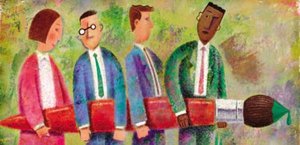
Most students of English as a second or foreign language want to use English for communicative purposes.
Most students of English as an L2 fail to become confident, proficient users of English.
Most of language learning is implicit. Language learning is not the same as learning about biology or geography: it is essentially a matter of implicit learning leading to procedural knowledge. Language learning is a process of learning by doing.
Most teachers of English as an L2 treat English as an object of study.
Most teachers of English as an L2 assume – not they are always aware of the assumption – that the English language can be reduced to its (grammatical, lexical, functional, phonemic, etc.) parts and that these parts can be further reduced into items that can be taught as an object of study in such a way that their students learn what they are taught.
Most teachers of English as an L2 pay scant attention – because they were never told about it by those responsible for training them- to the crucial difference between explicit and implicit knowledge of language, the difference between declarative and procedural knowledge, and the trajectory of interlanguage development.
Most teachers of English as an L2 are badly prepared for their job.
Most teachers of English as an L2 are badly paid, have little security, have little say in what they do, and work under bad conditions.
Most ELT trainers are badly prepared for their job.
Most celebrity ELT gurus are frauds. They pretend to know about how people learn an L2 while knowing almost nothing, and their advice to teachers is informed by their own commercial interests.
Most of those who benefit from the $200 billion industry of ELT see education as a commodity. The celebrity gurus are their sales team.
Most of us in ELT face a bleak future.
All of us, all of us who make up the huge band of intellectual workers in the ELT sector, must strive for change. Getting rid of coursebooks would be a good start.

